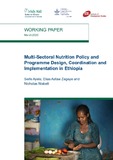Multi-Sectoral Nutrition Policy and Programme Design, Coordination and Implementation in Ethiopia
| dc.contributor.author | Ayele, Seife | |
| dc.contributor.author | Zegeye, Elias Asfaw | |
| dc.contributor.author | Nisbett, Nicholas | |
| dc.coverage.spatial | Ethiopia | en |
| dc.date.accessioned | 2020-03-31T16:11:14Z | |
| dc.date.available | 2020-03-31T16:11:14Z | |
| dc.date.issued | 2020-03-31 | |
| dc.identifier.citation | Ayele, S.; Zegeye, E.A. and Nisbett, N. (2020) Multi-Sectoral Nutrition Policy and Programme Design, Coordination and Implementation in Ethiopia, Brighton: IDS | en |
| dc.identifier.isbn | 978-1-78118-621-3 | |
| dc.identifier.uri | https://opendocs.ids.ac.uk/opendocs/handle/20.500.12413/15200 | |
| dc.description.abstract | Multi-sectoral nutrition governance has been hailed as an effective mechanism to reduce undernutrition. Ethiopia has adopted the approach and has been implementing nutrition programmes with some success, but undernutrition remains high for a range of reasons. This study explores political economy challenges facing Ethiopia in nutrition programme design, coordination and implementation, and looks at root causes that remain less understood. Using reviews of literature, qualitative interviews and a deep-dive study of two interventions, the study finds that the policy narrative has shifted in Ethiopia from the historically dominant narrative of ‘food and production security’ to ‘food and nutrition security’. The former ad hoc and reactive responses to droughts and famines have given way to an understanding of the complexity of undernutrition, its causes and consequences. However, in several critical areas, multi-sectoral nutrition coordination under the federal Ministry of Health, and regional bureaux of health, has been ineffective for many reasons, including lack of accountability mechanisms; perceived coordinator bias; inadequate staffing and resources; and low priority often given to programmes, which results in undernutrition – the ‘silent problem’ – being side-lined to ‘competing priorities’. As envisaged in the Food and Nutrition Policy, the study recommends setting up a well-equipped, and independent, multisectoral governance structure, and offers several recommendations that can reinvigorate the process towards sustainably reducing undernutrition. | en |
| dc.description.sponsorship | Irish Aid | en |
| dc.description.sponsorship | CGIAR Research Program on Agriculture for Nutrition and Health (A4NH) | en |
| dc.language.iso | en | en |
| dc.publisher | IDS | en |
| dc.rights | This is an Open Access paper distributed under the terms of the Creative Commons Attribution Non Commercial 4.0 International licence (CC BY-NC), which permits use, distribution and reproduction in any medium, provided the original authors and source are credited, any modifications or adaptations are indicated, and the work is not used for commercial purposes. | en |
| dc.rights.uri | http://creativecommons.org/licenses/by-nc/4.0/ | en |
| dc.subject | Nutrition | en |
| dc.subject | Politics and Power | en |
| dc.title | Multi-Sectoral Nutrition Policy and Programme Design, Coordination and Implementation in Ethiopia | en |
| dc.type | Other | en |
| dc.rights.holder | IDS | en |
| dc.identifier.team | Rural Futures | en |
| rioxxterms.funder | Default funder | en |
| rioxxterms.identifier.project | Default project | en |
| rioxxterms.version | VoR | en |
| rioxxterms.funder.project | 9ce4e4dc-26e9-4d78-96e9-15e4dcac0642 | en |
Files in this item
This item appears in the following Collection(s)
Except where otherwise noted, this item's license is described as This is an Open Access paper distributed under the terms of the Creative Commons Attribution Non Commercial 4.0 International licence (CC BY-NC), which permits use, distribution and reproduction in any medium, provided the original authors and source are credited, any modifications or adaptations are indicated, and the work is not used for commercial purposes.


